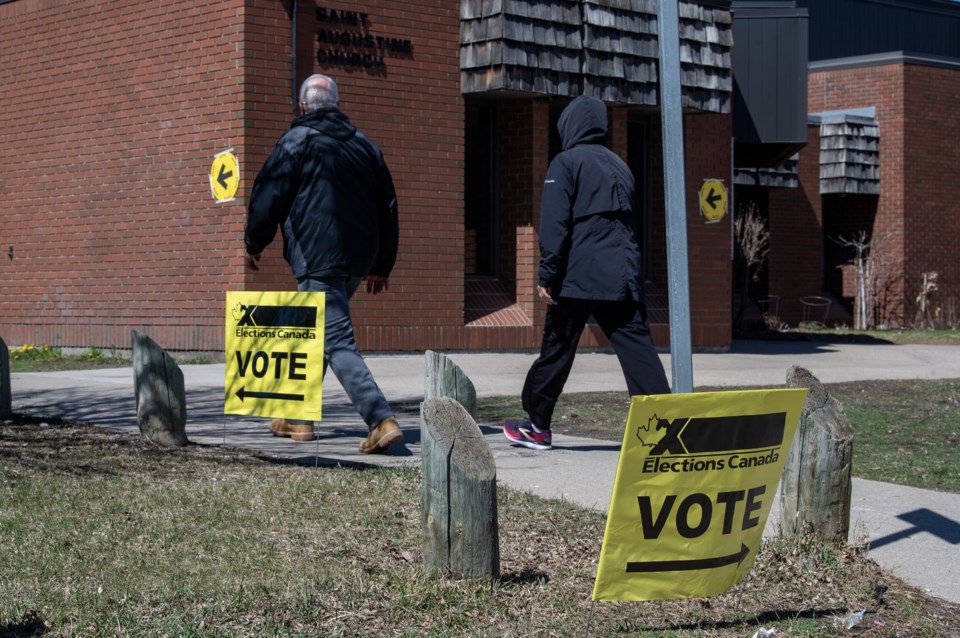OTTAWA — More than three quarters of Canadians believe misinformation had an impact on the outcome of the federal election, a new poll suggests.
The Leger poll, which sampled more than 1,500 Canadian adults from April 29 to May 1, suggests that 19 per cent of people think false information or misinformation had a major impact on the election.
Almost a third (32 per cent) said it had a moderate impact, while 26 per cent said it had a minor impact on the election's outcome.
Only nine per cent of Canadians said misinformation had no impact on the election at all.
The poll, which was conducted online and can't be assigned a margin of error, suggests that people in Alberta were the most likely to think misinformation affected the election, at 86 per cent.
Seventy-nine per cent of people in Quebec, 76 per cent of people in Ontario and 73 per cent of people in B.C. said misinformation had an impact.
While 80 per cent of men said misinformation played a role, 74 per cent of women said the same.
Voters aged 18 to 34 were most likely to think misinformation affected the election, at 81 per cent, compared to 77 per cent of people aged 35 to 54 and 74 per cent of people aged 55 and older.
Liberal supporters were the least likely to think misinformation had a role in the election, at 74 per cent, compared to 83 per cent of Conservative voters and 87 per cent of NDP voters.
Andrew Enns, Leger's executive vice-president for Central Canada, said there has been lots of talk over the last few years about foreign interference in Canadian politics and the issue may be in the back of voters' minds.
During the election campaign, Canadian security officials said they spotted a foreign online operation targeting a federal Conservative candidate opposed to Chinese government policies. The Security and Intelligence Threats to Elections Task Force also said it spotted an online information operation linked to the Chinese government that focused on Prime Minister Mark Carney.
Laurie-Anne Kempton, assistant secretary to the cabinet for communications, said in late April that Canadians could head to the polls with full confidence in the integrity and security of the system.
Federal officials also said that voters should be on the lookout for online disinformation tied to the election debates.
Enns said that "misinformation" is a large umbrella term and that poll respondents may have cited things like rumours and claims about candidates while filling out the Leger survey.
"I think it could be sort of a catch-all," he said. "Canadians tend to not like negative campaigns and negative campaign ads, for example, and so sometimes I wonder … does that get lumped into sort of that misinformation as well?"
The poll also suggests that just under two-thirds of Canadians (65 per cent) trust that the election results were accurate.
Thirty-six per cent said they trust the results "a great deal," while 29 per cent said they trust them "a lot."
However, 16 per cent said they trust the results only "a little" and 13 per cent said they don't trust them "at all."
People in Quebec were most likely to trust the results, at 77 per cent, compared to 70 per cent in B.C., 62 per cent in Ontario and 53 per cent in Alberta.
More people aged 55 and older said they had trust in the results, at 72 per cent, compared to 61 per cent of people aged 18 to 34 and 59 per cent of those aged 35 to 54.
Liberals were the most likely to trust the results, at 96 per cent, compared to 74 per cent of NDP voters and only 44 per cent of Conservatives.
Enns said the results point to an unfortunate but "very real" deterioration in people's faith in institutions.
"There's a party break in the trust where the Conservative supporters are less trusting, unfortunately," he said, adding that mistrust could be due to people hearing about interference or being exposed to conspiracy theories.
Enns said Leger did not ask Canadians about misinformation or trust in results after the 2021 election.
The Elections Canada website says that about half (52 per cent) of people who responded to a National Electors Study thought the spread of false information online was a problem during the 2021 election — 50 per cent said the same thing about the 2019 election.
The study found that a quarter of respondents thought foreign countries or groups trying to interfere with the election or the political opinions of Canadians had been a problem in the 2021 election, compared with 31 per cent in 2019.
Elections Canada says close to one in 10 respondents thought false information had a major impact on the outcome of the 2021 election, and 20 per cent thought it had a moderate impact. Eighteen per cent of respondents said it had only a minor impact on the outcome, while only two per cent said it had no impact. The agency says those results were similar to those obtained after the 2019 election.
Elections Canada says four per cent thought that problems of foreign interference had a major impact on the outcome of the 2021 election, nine per cent thought it had a moderate impact, 10 per cent thought it had a minor impact and one per cent said it had no impact.
The polling industry's professional body, the Canadian Research Insights Council, says online surveys cannot be assigned a margin of error because they do not randomly sample the population.
— With files from Jim Bronskill
This report by The Canadian Press was first published May 3, 2025.
Catherine Morrison, The Canadian Press



